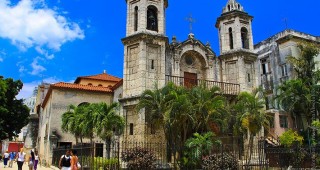Factoría Habana is an experimental center for present-day artistic creation. The institution, which is ascribed to the City Historian’s Office, seeks to become a bridge between Latin American and European art.
Factoría Habana is an experimental center for present-day artistic creation. The institution, which is ascribed to the City Historian’s Office, seeks to become a bridge between Latin American and European art.

 3
3Housed in a former colonial mansion built from 1806 to 1817, the Casa-Museo del Libertador Simón Bolívar is dedicated to honoring the “Great Liberator” who led the Latin American nations’ independence …

 3
3Tucked down a cobble-side street around the corner from the Depósito del Automóvil is the “House of Comedy.” Plays were first performed here in 1778. Today, it promotes new Cuban plays. Admission deta …

 3
3The main feature of this tiny but lovely tree-shaded park, which occupies the site of a collapsed colonial building, is a sculpture given to Fidel Castro by Ecuadorean artist Oswaldo Guayasamín (1919- …

 3
3Mid-way along the west side of the Basílica Menor y Convento de San Francisco de Asís, Calle Brasil (Teniente Rey) leads south one block to Plaza Vieja. Exposed in the center of the cobbled street are …

 3
3Calle Línea is one of the most important streets in Havana and was the first one in Vedado. This avenue gets its name from the streetcar tracks (in Spanish, líneas) that ran along this street. It was …

 3
3This institution is supported by donations from Ediciones Boloña, a publishing house of the City Historian’s Office. Its purpose is to make known the work of the famous French author Victor Hugo, as w …

 3
3Habana 1791: The perfume shop Located in an 18th-century mansion at the corner of Mercaderes and Obrapía, this beautiful shop and laboratory sells 12 varieties of scents or colognes. The bottles are m …

 3
3Built in 1886, the Calixto López y Compañía tobacco factory and warehouse takes up the whole block between Zulueta, Economía, Gloria and Misión streets. It has the typical ground floor, mezzanine and …
 Neo-classicalZulueta e/ Gloria y Misión, Habana Vieja
Neo-classicalZulueta e/ Gloria y Misión, Habana Vieja 
 3
3This building of imposing image is an example of conventionalism at a time when the architectural avant-garde had already paved the way for new, bolder ideas. From that premise, however, this construc …
 Art DecoCarlos III (Avenida Salvador Allende) #506-508 esquina a Belascoaín (Padre Valera)
Art DecoCarlos III (Avenida Salvador Allende) #506-508 esquina a Belascoaín (Padre Valera) 
 3
3Erected in 1640 simultaneously with the Plaza del Cristo around the Ermita del Humilladero–the final station of the Vía Crucis or procession of the Stations of the Cross on Good Friday, which started …
 ColonialAdmission: FreeOpen: 9am-6pm, Tues-SunVillegas e/ Lamparilla y Teniente Rey, Habana Vieja
ColonialAdmission: FreeOpen: 9am-6pm, Tues-SunVillegas e/ Lamparilla y Teniente Rey, Habana Vieja